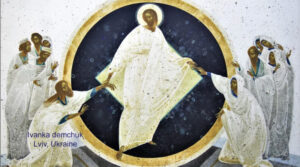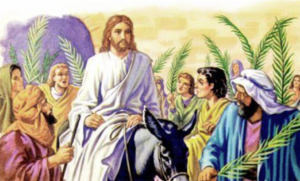“Jesus said to his apostles:
‘Whoever loves father or mother more than me is not worthy of me, and whoever loves son or daughter more than me is not worthy of me. . . . Whoever finds his life will lose it, and whoever loses his life for my sake will find it.’” Matthew 10:37, 39
+++++
This Gospel passage always disturbs me more than I would like. Think about it. How I, and perhaps some of you reading this, order our everyday lives to do exactly as Jesus says not to do. We spend much of our everyday lives protecting and preserving our well-being and that of our loved ones. Is there a danger – for us and for our loved ones – in doing this? Let’s think about this.
TOO MUCH OF A GOOD THING
If we are not careful, will our over-attentiveness to ourselves and our families erode something that we need also to protect? Might too much emphasis on ourselves and our families diminish our ability to see those beyond our families – to see them as our brothers and sisters in need of those same things that we are trying to provide for our own families? And isn’t the whole purpose of God becoming man to help us see this and provide an example to follow of a man whose actions flow out from a mind and heart that loves God above all, even above family and self?
HELPING US PUT AND KEEP GOD FIRST IN OUR MINDS AND HEARTS
Numerous Gospel passages speak of Jesus going off by himself to pray. We need to do that, too, so that our hearts remember in the midst of the everyday family-oriented activities that it is the whole of God’s family that comes first. If we don’t, we run the risk of forgetting that, in God’s eyes – the only view of things that really matters – we are, first and foremost, every one of us, members of God’s family.
FIRST PRECEPT OF THE CHURCH:
Much wisdom is contained in the Catholic faith’s Precepts (Commandments) of the Church which many people erroneously consider merely man-made and non-essential to follow. As stated in the Catechism of the Catholic Church, section 2041, the Church’s hope, in creating these Precepts is that in following them we will grow in “the spirit of prayer and moral effort, in the growth in love of God and neighbor.”
I hope that the present period of social distancing has not created a “new normal” that precludes us from seeing the wisdom of our weekly gathering in church for Mass. And I say this, not because I want our church attendance to return to or exceed the levels it once had. (That would be great but it has nothing to do with my concern which is for each and every one of you.) Rather, I say it because you and I need this time together for “growth in love of God and neighbor.” And we need this time praying and celebrating Jesus and our Triune God, looking at God and at each other, and uniting ourselves beyond the borders of our families, townships, nations, world and universe – all united and participating in God’s life.
RETURNING TO WEEKEND MASS
I understand that it will take time for the COVID-19 restrictions to be lifted completely, so it will be some time before we all gather again as St. Michael’s weekend worshiping community. But let’s remember that, when we once again can gather, for our own and everyone else’s good, we need to be part of that weekly-gathered worshiping community.
Sister Loretta
+++++
From the Catechism of the Catholic Church
The Precepts of the Church
2041 The precepts of the Church are set in the context of a moral life bound to and nourished by liturgical life. the obligatory character of these positive laws decreed by the pastoral authorities is meant to guarantee to the faithful the indispensable minimum in the spirit of prayer and moral effort, in the growth in love of God and neighbor:
2042 The first precept (“You shall attend Mass on Sundays and holy days of obligation.”) requires the faithful to participate in the Eucharistic celebration when the Christian community gathers together on the day commemorating the Resurrection of the Lord.82
The second precept (“You shall confess your sins at least once a year.”) ensures preparation for the Eucharist by the reception of the sacrament of reconciliation, which continues Baptism’s work of conversion and forgiveness.83
The third precept (“You shall humbly receive your Creator in Holy Communion at least during the Easter season.”) guarantees as a minimum the reception of the Lord’s Body and Blood in connection with the Paschal feasts, the origin and center of the Christian liturgy.84
2043 The fourth precept (“You shall keep holy the holy days of obligation.”) completes the Sunday observance by participation in the principal liturgical feasts which honor the mysteries of the Lord, the Virgin Mary, and the saints.85
The fifth precept (“You shall observe the prescribed days of fasting and abstinence.”) ensures the times of ascesis and penance which prepare us for the liturgical feasts; they help us acquire mastery over our instincts and freedom of heart.86
The faithful also have the duty of providing for the material needs of the Church, each according to his abilities.87
82 Cf. ⇒ CIC (Codex Iuris Canonici), cann. 1246-1248; CCEO (Corpus Canonum Ecclesiarum Orientalium), can. 881 # 1, # 2, # 4.
83 Cf. ⇒ CIC, can. 989; CCEO, can. 719.
84 Cf. ⇒ CIC, can. 920; CCEO, cann. 708; 881 # 3.
85 Cf. ⇒ CIC, can. 1246; CCEO, cann. 881 # 1, # 4; 880 # 3.
86 Cf. ⇒ CIC, cann. 1249-1251; CCEO, can. 882.
87 Cf. ⇒ CIC, can. 222.




